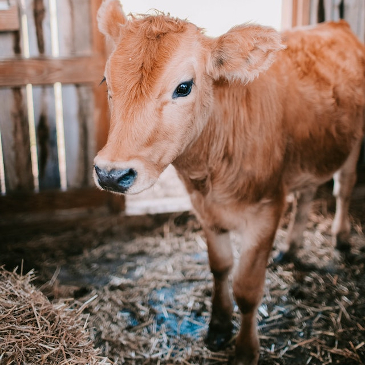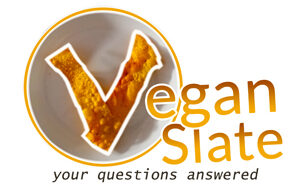Vegans make up less than 5% of the global population yet the mere presence of our movement seems to elicit negative reactions in many non-vegans. So why is veganism being pushed into the mainstream more and more? Why do such a small group of people have such a loud voice?
Why Is Veganism Being Pushed?
It seems like veganism is being pushed heavily because proponents of our movement feel so strongly about the cause, they will go to great lengths to spread the word. But even though we’re gaining traction day by day, we’re still in a very small minority.
Watch: Jordan Peterson’s wild claims wholly debunked using simple logic.
(‘Lifting Vegan Logic’ is unarguably systematic in his takedown of Peterson)
Vegans Believe Passionately In The Cause
When someone decides to go vegan it is often because they have witnessed something disturbing about the way animals are treated on modern factory farms.

It’s not only meat production … the connection is just easier to make when it comes to meat because the animal obviously has to die for that steak to arrive on your plate.
But dairy production is also highly problematic and quite possibly, even more cruel than the meat industry. It’s less obvious with dairy though and maybe easier to hide the truth.
Once you have seen the truth behind a modern dairy farm it’s impossible to unsee and this is why vegans feel so strongly about their cause.
Meat Is Scary & So Is Dairy
I was vegetarian for 20 years before taking the final step into veganism. I had no idea why vegans are against milk consumption. To me they were just a bit extreme.

For those 20 years I was blissfully unaware of the daily horrors visited on dairy cows and their offspring. When my wife showed me some footage of a modern dairy ‘unit’ I was moved to my core.
This snowflake doesn’t mind telling you that I broke down and cried that night.
I witnessed unashamed and blatant cruelty perpetrated on an innocent being by some cowardly farm worker. The animal was treated with utter disdain and it was clear this behaviour was commonplace … at least on that fine establishment.
My switch to veganism happened at that very moment and I have never looked back.
I thought, “maybe that video is just a one-off”. So I spent the next few months doing my own research, seeking out video footage of dairy farms. Some secretly filmed and some recorded in the full knowledge of the farm owner.
What I found was scary as hell.
I came to realise pretty quickly that the dairy industry is just as barbaric as the meat industry … and make no mistake, they are industries.
The hell holes these animals inhabit certainly cannot be described as small family farms.
Their reality is far removed from the idyllic scenes on the front of your milk bottle.
People Wonder Why Vegans Seem Pushy
How do such a small group of people make such a loud noise?
 With 95% plus of the world’s population consuming meat and dairy regularly, why would anyone care about veganism being pushed so voraciously?
With 95% plus of the world’s population consuming meat and dairy regularly, why would anyone care about veganism being pushed so voraciously?
Maybe it is because, deep down, we all know how morally bankrupt it is to impose our speciesist ‘superiority’ on other animals who want to live.
I’ve used quotes on the word superiority because vegans believe that humans are no more superior than the cow or the pig or the sheep which will die for your dinner plate.
For all vegans who have done it for the sake of the animals (which is the only reason you can go vegan), the emotion is often overwhelming. Especially at first.
When you learn of the injustice and arrogance of those dealing in these gruesome trades, the well of fire builds in your stomach and it has to be released somehow.
Like many others, you turn to social media, the internet and direct action to spread the word.
 Then you learn of those people who are fully aware of the horrors on modern factory farms yet still decide to change nothing about their life because of … err .. reasons, reasons.
Then you learn of those people who are fully aware of the horrors on modern factory farms yet still decide to change nothing about their life because of … err .. reasons, reasons.
This infuriates many vegans because it is unfathomable to us how someone could turn a blind eye to the unbridled cruelty and abuse of other sentient creatures.
Ignorance is easier to understand because we’ve all been there. Nearly every vegan on the planet once drinked milk and ate meat … me included.
I used to guzzle down pints of the white stuff every day. Completely oblivious to how that hormone-laden calf rearing fluid made it into my glass.
20 years of pure ignorance before my eyes were opened.
A Small Minority With a Loud Voice
This is why 5% of the population can upset a good chunk of the other 95%.
 Veganism challenges your moral compass and makes you think about your choices. For many people, when confronted with that choice, it’s too much to process and the reaction is to withdraw back to safety.
Veganism challenges your moral compass and makes you think about your choices. For many people, when confronted with that choice, it’s too much to process and the reaction is to withdraw back to safety.
These people are not ready to accept the truth and feel threatened by the 5%. They feel like vegans are pushing their agenda onto others and they adopt illogical moral positions.
Otherwise known as cognitive dissonance.
Most decent humans on this planet know, deep down, the way we treat our ‘food animals’ is morally questionable. The only thing vegans have done is take the next logical step.
Veganism Is Selfless & Compassionate
It’s really not about pushing a vegan world view on anyone. Veganism comes from a place of empathy, compassion and selflessness.
 Yes, some of us have loud voices in the same way other social justice movements have their charismatic leaders. But most vegans just go about their lives quietly getting on with it.
Yes, some of us have loud voices in the same way other social justice movements have their charismatic leaders. But most vegans just go about their lives quietly getting on with it.
If you’re sitting on the fence about veganism I urge you to consider our collective future. I urge you to use your critical thinking, logical mind.
Our current trajectory is unsustainable. That much is very clear.
Is it time for you to join the 5%?
With Veganuary just around the corner, why not sign up for the challenge and give it a go?
I hope this article has helped you see the issues around veganism more clearly and has helped you answer your question today. Please comment below and share with your friends. It all helps.
Thanks for reading and do sign up for our updates here.
Rohan.

For a group that claims to detest violence, they are some of the most violent people in the world. It comes down to not eating meat. There have been actual scientific studies done proving meat is the difference, that plants in humans actually cause aggression. Never mind the fact that there are amino acids necessary for human life and health that can only be obtained through meat consumption. With all the push for animals to eat biologically appropriate foods, I wonder why the exact opposite is being pushed on humans. We have teeth like a carnivorous animal as well as plant eaters. We are designed by God to eat both. I personally don’t care that a cow was living before it was my hamburger, because that carrot was living too before it was brutally ripped out of the ground to be cooked up. What is more important is how the animals are treated prior to slaughter and many slaughter houses these days include teaching people to respect the living animals. I will never forget the video of slaughter house training when the cows eagerly walked up to the people looking for treats and just how quickly and painlessly the animals were dispatched with the teacher emphasizing how important it was that the animals not only be treated with respect while alive, but that they not feel fear or stress when being slaughtered, because fear causes stress hormone release that negatively effects the flavor of the meat, besides being unkind to a living animal. Most of the students were surprised that the process was not as brutal as they thought. This is what really needs to be pushed, treating animals better (within reason of human safety always being top priority), not biologically inappropriate diets. I know where meat comes from, I’ve seen the process myself, and I’m not turned off by it. I appreciate that humans have cared for these animals and protected them and that they repay that easy comfortable life by sustaining mine with their meat and dairy. Incidentally, I had a friend who’s father owned a local dairy, and they didn’t slaughter calves or separate them from their dams, she said that was ridiculous and there was no need. The cows produced enough milk for both their calves and the humans. Maybe it’s best to know your farmers and others in the process and only purchase products from establishments that treat the animals respectfully. Maybe we should anyway, if they can’t treat a dumb animal with respect do you believe they will respect you by providing a good and well handled product? People who have care in their work have care in what they do and thus have care for those around them.
Thank you for sharing your thoughts! Let’s break down the points you’ve raised and explore them further:
“Vegans are violent people; plants cause aggression”:
– This claim is a myth. No credible scientific studies suggest that eating plants causes aggression. In fact, numerous studies show that plant-based diets are associated with improved mental health and reduced inflammation. Conversely, consuming excessive animal products has been linked to higher risks of chronic illnesses, which can indirectly affect mood and behavior.
“Amino acids necessary for life can only be obtained through meat”:
– This is incorrect. All essential amino acids can be obtained from a well-planned vegan diet. Plant-based sources like quinoa, soy, lentils, beans, nuts, and seeds provide complete proteins. Moreover, organizations like the Academy of Nutrition and Dietetics have stated that vegan diets are nutritionally adequate for all stages of life.
“Humans are biologically designed to eat both meat and plants”:
– While humans are omnivores by adaptability, our physiology leans toward herbivory. Our molars resemble those of herbivores, designed for grinding plants, not tearing flesh like true carnivores. Our long digestive tracts are optimized for plant digestion, whereas carnivores have shorter tracts to quickly process meat. The choice to eat meat is cultural, not biological necessity.
“Carrots are living too; killing them is no different from killing a cow”:
– Unlike animals, plants lack a central nervous system, brain, or the ability to feel pain. Pulling a carrot from the ground is not morally equivalent to killing an animal that can experience fear, pain, and distress. The two acts are fundamentally different in ethical terms.
“Slaughterhouses are humane; animals don’t feel fear”:
– While some slaughterhouses may attempt to minimize suffering, the process is inherently violent. Numerous investigations have revealed widespread abuse, stress, and fear among animals before and during slaughter. Even under the “best” conditions, the act of taking an animal’s life unnecessarily when alternatives exist is inconsistent with respecting that animal.
“Dairy farms can keep calves with their mothers”:
– While your friend’s dairy may have avoided separating calves, this is an exception, not the norm. In the dairy industry, calves are routinely removed from their mothers within hours to days to maximize milk production. The emotional distress this causes to both cow and calf is well-documented. Furthermore, dairy cows are forcibly impregnated to maintain milk production, which many argue is exploitative.
“Meat is repayment for an easy life”:
– Framing an animal’s existence as repayment for “care” undermines the animal’s right to life. Animals do not willingly agree to this arrangement, nor can they consent to their deaths. Providing basic care to an animal does not justify killing it when alternatives exist.
“It’s best to know your farmers and support respectful practices”:
– While supporting ethical farming practices is a step forward, it doesn’t address the core issue: the exploitation and killing of sentient beings for food. Even in the most “humane” systems, animals are still denied their natural lifespan and freedoms.
“Humans need biologically appropriate diets”:
– A plant-based diet is biologically appropriate for humans. It provides all essential nutrients when planned properly and reduces the risk of chronic diseases like heart disease, diabetes, and certain cancers. Globally, many health organizations endorse plant-based diets as suitable for all life stages.
“Animal treatment is what needs improvement”:
– While better treatment is preferable, it does not eliminate the fundamental ethical issue. Killing animals for unnecessary purposes (when we can thrive on plants) contradicts the principle of reducing harm.
The core message of veganism is simple: it’s about minimizing harm and aligning our actions with our values of compassion and justice. With abundant plant-based options available today, we can nourish ourselves without causing unnecessary suffering to animals.
Thanks for engaging in this discussion—it’s always a step forward in understanding!